Transform Pool Care with Everyday Household Items
September 23th, 2024
September 23th, 2024
On a warm summer afternoon, the inviting blue shimmer of a backyard pool can be the perfect escape. However, maintaining that pristine allure requires more than just a regular sweep or a top-up of chlorine. What many pool owners might not realize is that the answer to crystal-clear water could be sitting right in their kitchen or laundry room. Everyday household products, often overlooked, can be effective allies in keeping your pool sparkling clean without the hefty price tag of specialized chemicals.
A while back, I stumbled upon this revelation while rummaging through my pantry, searching for anything that could tackle the stubborn algae bloom taking over my pool. Surprisingly, a simple box of baking soda did wonders, adjusting pH levels and leaving the water clear and inviting. It's moments like these that underline the versatility and effectiveness of everyday items, transforming them from mundane to magical in the world of pool maintenance.
Exploring the potential of household products not only saves money but also reduces the chemical footprint we leave behind. Gentle on your pocket and the environment, these items offer simple solutions backed by personal experience and a dash of ingenuity. As we delve into these unconventional cleaners, each one promises to be a game-changer, making pool maintenance less of a chore and more of a rewarding endeavor.
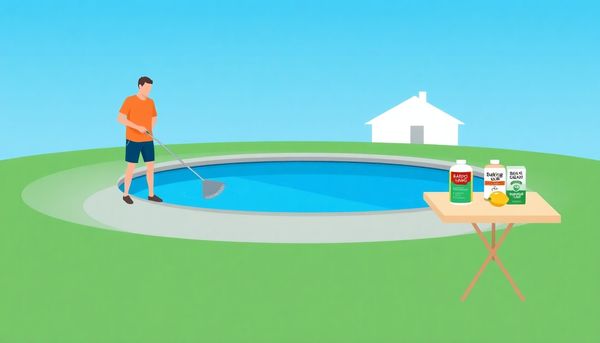
Turning everyday household items into pool-cleaning heroes might seem unconventional, but these unsung warriors can rival the heavyweights sold in pool stores. Picture a shimmering oasis, maintained without the harshness of traditional chemicals. That’s what using household products promises. A splash of creativity paired with common pantry staples can keep your backyard retreat pristine and inviting.
Start with baking soda, a familiar friend in the kitchen. Beyond its culinary uses, it morphs into a non-abrasive scrub perfect for tiles and concrete. Its magic doesn’t stop there; a sprinkle can enhance your pool’s alkalinity, balancing the water chemistry naturally. For those stubborn stains that refuse to budge, bleach steps in with its muscle, tackling grout discoloration with ease. The secret? Just a gentle hand and a watchful eye on the chlorine levels.
Look closer to your laundry room, where Borax stands ready. This laundry booster doubles as a stain fighter in the pool, effortlessly lifting away sticky residues. And for the eco-conscious cleaner, vinegar offers a gentle touch, dissolving calcium buildup on tiles and leaving metal fixtures gleaming.
The next time you consider reaching for expensive pool chemicals, pause and rummage through your home first. With these household staples, pool cleaning becomes not just a chore, but an art—one that’s cost-effective, eco-friendly, and surprisingly effective. So gather your tools and dive into a world where your home’s ordinary items become extraordinary pool caretakers.
When I first started looking for ways to clean my pool without harsh chemicals, I was surprised by the effectiveness of everyday household items. Baking soda, a staple in most kitchens, can be a game-changer for pool maintenance. Mixing it with water to form a paste cleans pool tiles and grout seamlessly, providing a sparkling finish without leaving scratches. Not only that, but it's also a fantastic, budget-friendly method to boost your pool's alkalinity.
Another surprising discovery was the power of vinegar. Just as it descales our coffee makers, a 50/50 solution of vinegar and water makes quick work of calcium deposits along the pool edges. The process is simple: dip a cloth or sponge in the mixture and wipe the unsightly buildup away. It’s reassuring to use a natural product that won't harm your pool's balance.
Let’s not overlook the multipurpose wonder that is lemon juice. This citrusy cleaner, mixed with salt to create a slurry, tackles rust and grime on metal and tile surfaces with ease. Want a greener approach? Plant a lemon tree nearby and enjoy the dual benefits of shade and a ready supply of natural cleaning power.
These alternatives not only reduce your reliance on harsh chemicals but also provide cost-effective solutions that keep your pool safe and inviting. With a bit of experimentation, these natural methods can transform your pool maintenance routine.
A trek through the aisles of a grocery store often reveals unexpected allies in the quest for pool cleanliness. Baking soda, for instance, is not just a staple for cakes and cookies; it’s a silent powerhouse in the world of pool maintenance. Its mildly abrasive texture makes it perfect for scrubbing away grime on pool tiles without scratching them. Bonus? It can also help balance your pool’s pH levels without breaking the bank—just another reason to keep a hefty supply on hand.
Household bleach, with its potent sanitizing properties, can serve as a budget-friendly pool shock. It might not have the fancy branding of pool-specific chlorine, but when it comes to eliminating bacteria and algae, bleach does the job splendidly. Remember to use unscented bleach to maintain chemical balance and avoid any unwanted fragrances in your pool water.
Borax, often thought of as a laundry booster, secretly doubles as a poolside hero. It’s incredibly effective at raising the pool’s pH levels, providing a cost-effective way to maintain water clarity. Its versatility extends beyond just balancing pH; it can tackle stains and grime with little effort. Simply mix it into a paste and scrub away stubborn spots on your pool surfaces.
By tapping into these common household items, you not only create a more affordable pool maintenance routine but also embrace a more sustainable approach. The result? A sparkling pool that doesn’t compromise on cleanliness or your wallet.
In the midst of bustling life, simplicity often holds the key to unexpected solutions. When it comes to pool maintenance, your pantry and cleaning cabinet might just be hiding invaluable allies. Household ingredients, often overlooked, can effectively tackle grime, algae, and other nuisances in your pool without the hefty price tag of commercial products.
Imagine this: a stubborn stain on your pool tiles. Instead of reaching for pricey chemicals, grab a box of baking soda. Mixed with a little water, this humble kitchen staple transforms into a gentle yet powerful scrub that wipes away grout stains and hard water marks. Not only does it refresh your tiles, but it also boosts your pool's alkalinity when added directly to the water. A true multitasker!
Perhaps chlorine levels are a concern? Unscented household bleach steps in as a reliable substitute for traditional pool shock. A careful dose can elevate your pool’s cleanliness to crystal clear standards. For those pesky calcium deposits, white vinegar emerges as a hero. With a simple 50/50 mix of vinegar and water, calcium buildup surrenders easily, leaving your pool’s edges gleaming.
These tried-and-true remedies not only save money but also minimize chemical exposure, aligning with a more eco-friendly lifestyle. Next time pool cleaning rolls around, take a look inside your home, and you might just find all the help you need right there.
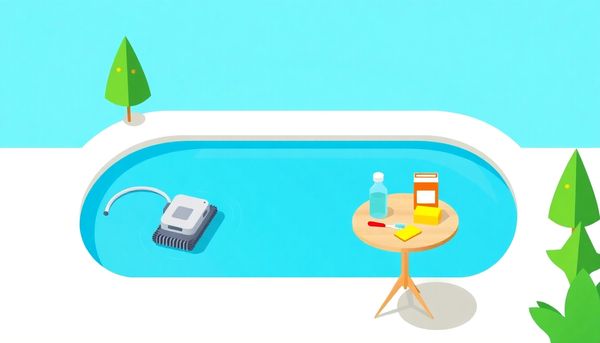
Scrubbing the pool deck with commercial cleaners might not be everyone’s cup of tea, especially when simpler, more natural alternatives exist. Think about the last time you wiped down a countertop with vinegar or tackled bathroom grout with baking soda. The same principles can be applied to pool maintenance, allowing for effective cleaning while minimizing chemical exposure.
Baking soda, for instance, can effortlessly restore the gleam to pool tiles without scratching them. Mixing it with water forms a gentle paste, ideal for removing grime from grout. Beyond its cleaning prowess, baking soda can also adjust your pool’s alkalinity, providing dual benefits with a simple sprinkle.
Bleach is another household staple capable of tackling stubborn stains. With careful application, a diluted bleach solution can sanitize and refresh your pool water, clearing away murky residues. Just ensure you opt for the unscented kind to avoid any unwanted aromas lingering in your backyard oasis.
For those averse to synthetic additives, look no further than your kitchen pantry. Lemon juice, combined with a dash of salt, creates a potent yet safe cleaner. Its citric acid content not only dissolves calcium deposits but leaves a refreshing scent in its wake, transforming arduous cleaning tasks into a citrus-scented affair.
Finally, while employing these natural wonders, always remember their limitations. Certain pool imbalances may still require specialized chemicals, but integrating household products into your routine can significantly reduce reliance on them and keep your pool sparkling naturally.
Strolling through your kitchen or laundry room, you might be surprised by the potential hidden within everyday items. Take baking soda, for instance—a staple for fluffy cakes and a gleaming pool. Mix it with water to form a paste, and you'll have a gentle yet effective cleaner for your pool tiles and grouting. It’s as if your household superhero just traded its apron for a cape. Astonishingly, it also boosts your pool’s alkalinity. A sprinkle here and a pound and a half there (per 10,000 gallons), and you’ve got a pool chemistry hack that could rival any high-priced product on the shelf.
Moving over to the laundry supplies, you might find Borax, often celebrated for its odor-busting prowess. This multi-tasker doesn’t stop at your clothes. When mixed with water, Borax becomes a fierce grime fighter, tackling poolside stains with ease. It’s remarkable how it also manages to elevate your pool’s pH levels, making it an unsung hero in pool maintenance.
Not to be outdone, vinegar, that versatile kitchen companion, does wonders with calcium deposits. A quick 50/50 blend with water and a bit of elbow grease, and your pool’s waterline is as good as new. This simple trick not only saves money but also reduces the chemical footprint of your pool maintenance routine. Who knew everyday ingredients could transform into such powerful allies in the quest for a sparkling pool?
Revamping your pool's alkalinity doesn't always require a trip down the chemical aisle. Among the myriad of simple household items, baking soda stands out as a cost-effective and eco-friendly solution. Found in most kitchen pantries, baking soda, or sodium bicarbonate, naturally raises the alkalinity of your pool water without introducing harsh chemicals.
Start by calculating the volume of your pool to determine the right amount of baking soda needed. Typically, adding 1.5 pounds of baking soda per 10,000 gallons of water raises the alkalinity by about 10 parts per million (ppm). This approach not only stabilizes the water's pH levels but also ensures a safer swimming environment by reducing the risk of skin irritation and corrosion to pool equipment.
Twelve years ago, my family and I decided to opt for more natural solutions for our pool upkeep. We turned to baking soda and never looked back. Not only did we save on pool maintenance costs, but we also noticed a significant improvement in water quality. The water felt smoother, and we avoided the sharp chemical smell that sometimes accompanies pool chemicals.
Besides its alkalinity-boosting properties, baking soda also doubles up as an excellent cleaner for pool tiles and grout, making it a versatile ally in your pool maintenance toolkit. If you're aiming for a more sustainable and wallet-friendly pool cleaning method, baking soda might just be your new best friend.
Who would have thought a jug of white vinegar or a box of baking soda could rival those flashy pool store products? With a bit of innovation, common household items become valuable tools in maintaining a sparkling pool. Take baking soda, often nestled in your pantry, which transforms into a gentle, non-abrasive cleaner perfect for scrubbing tiles and pool decks. When mixed with water, it forms a paste that tackles grime effectively, without the harshness of commercial cleaners.
And then there's bleach. While it might conjure images of laundry day, bleach is a formidable ally against stubborn pool stains. A bit of it can breathe new life into your pool, turning murky water into a clear oasis. Just be cautious with its potential to overpower—use the unscented variety and add it in moderation.
Venture into the kitchen again, and you’ll find olive oil, an unsuspecting pool hero. While not suitable for the water itself, olive oil excels at breaking down sticky residue on pool decks and covers. It’s a gentle solution, leaving behind a clean surface and a hint of Mediterranean flair.
Lastly, for that pesky calcium buildup, reach for white vinegar. A simple mix of vinegar and water can make those unsightly white lines vanish, restoring the pristine view of your pool. Each of these solutions, found at arm’s reach, proves that cleaning your pool doesn't have to mean breaking the bank or resorting to harsh chemicals.
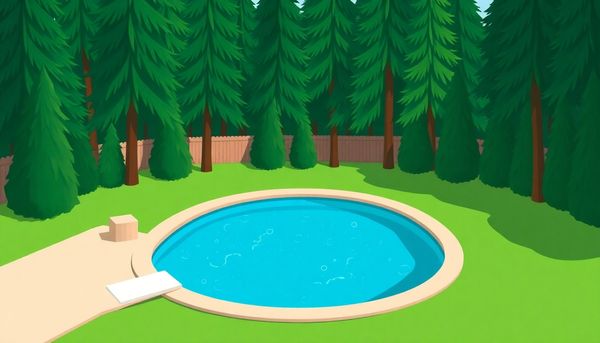
Finding thrifty solutions for pool maintenance can be surprisingly simple. Common household items, often lurking in your kitchen cupboard or laundry room, not only cut costs but also serve as effective pool cleaners. A friend of mine swears by baking soda—not just for her pool, but also for her home cleaning arsenal. When mixed with water, this versatile powder transforms into a gentle scrub that tackles grime on pool tiles, leaving surfaces spotless without harsh chemicals.
Another hidden gem is white vinegar. While it's a staple for salads, its acidity works wonders against calcium deposits and mineral buildup along your pool's waterline. A half-and-half mix with water, applied with a sponge, can eliminate that unsightly chalky film in minutes. Plus, its safety around kids and pets is an added bonus.
For a chlorine boost without the pool store price tag, consider unscented household bleach. Carefully measured, this simple solution can effectively shock your pool, keeping algae and bacteria at bay. My neighbor, a seasoned pool owner, uses it to maintain sparkling water, touting it as a cost-effective substitute for expensive pool-specific chemicals.
These DIY tricks not only save money but also provide peace of mind, knowing your pool is clean without compromising on safety or quality. As you explore these options, always remember to test your water regularly to ensure it remains balanced and healthy for swimming.
If you've ever peered at the shimmering surface of your pool and wondered, "Do I really need all those chemicals?" you're not alone. There's a wealth of natural cleaning options right under your nose—and in your pantry. These alternatives not only save money but also offer a gentle approach to maintaining your backyard oasis.
Baking soda, for example, wears many hats. Beyond baking, it doubles as a fantastic, non-abrasive scrub for your pool tiles and grout. Create a simple paste with water to wipe away grime, and as a bonus, this same ingredient can elevate your pool’s alkalinity levels, ensuring a balanced swimming environment. I once swapped my pricey alkalinity increaser for baking soda, and the results were surprisingly effective.
On the darker side of the spice rack, there's good old-fashioned vinegar. Known for its prowess in cutting through calcium buildup, it can tackle those stubborn waterline stains with a simple 50/50 vinegar-water solution. I’ve personally used this trick to restore the gleam on my pool ladder handles—just a dab of vinegar, and they sparkled anew.
And don't overlook the humble lemon. Its citric acid makes it an all-natural rust and grime fighter. Mix it with a bit of salt to clean metal fixtures or tile, leaving behind a fresh scent that beats any chemical cleaner. I planted a lemon tree nearby, which not only provides a constant supply of lemons but also a little shade on scorching days.
With these natural solutions, maintaining your pool becomes an exercise in simplicity and sustainability. So next time you gear up for pool maintenance, reach for these household heroes and enjoy a cleaner, more eco-friendly splash zone.
Friends often debate the best way to maintain a pool without relying heavily on chemicals, and the answer might just be sitting in your pantry or under your sink. Leaning into nature, you can tackle pool maintenance with some everyday household items that are both effective and gentle on the environment.
Consider using vinegar for stubborn calcium buildup along the pool's waterline. Much like how it descales a kettle, a 50/50 mix of vinegar and water on a sponge can make those unsightly deposits disappear. This solution is especially useful on metal fixtures around the pool, leaving them gleaming without a chemical aftertaste.
Another surprising hero is baking soda. Not only does it serve as a gentle abrasive cleaner for tiles and grout, but it also helps balance alkalinity. Toss a bit into your pool to see it double as a cleaner and a balancing agent. It's a budget-friendly option that many pool owners, myself included, swear by for maintaining sparkling water.
For a unique touch, lemon juice can be your go-to for polishing metal and eradicating minor rust spots. The citric acid works wonders and leaves a refreshing scent behind. And should you run out of lemon juice, the citrus oils in the peel can also offer minor cleaning benefits.
These approaches not only cut costs but also minimize chemical exposure for swimmers. By using these natural alternatives, you're not only preserving your pool but creating a safer swimming environment for everyone.
Opening your kitchen cabinet might just reveal a treasure trove of pool-cleaning solutions you never knew existed. Consider baking soda, that humble box nestled alongside your spices. It's not just for cookies—mix it with water to form a paste, and you’ve got a gentle yet effective cleaner for pool tiles and grout. It also boosts your pool's alkalinity, making it a dual-purpose wonder.
Moving over to the laundry room, you might spot a familiar face: Borax. Though usually reserved for dingy clothes, it can step up as a pool hero too. A simple paste of Borax and water eliminates stubborn stains and sticky spots. Plus, it can subtly raise your pool's pH, enhancing water quality without harsh chemicals.
And let’s not overlook the simplicity of vinegar. Normally pitted against kitchen grime, this liquid can tackle calcium deposits along your pool’s waterline. A 50/50 vinegar and water mix applied with a cloth can make those unsightly stains vanish, leaving your pool looking pristine.
These everyday items not only scrub away grime but also simplify pool maintenance, allowing you to swim worry-free. So next time you’re restocking groceries, think of what’s already at home. With a little creativity, keeping your pool clean and inviting becomes a breeze.
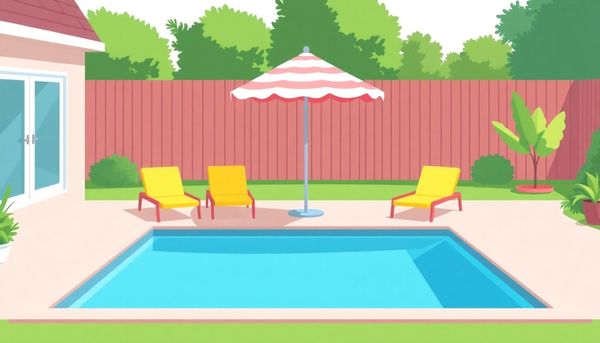
The allure of a sparkling pool is undeniable, especially when you know it's maintained with natural products. It's like having a mini-eco sanctuary in your backyard. One might recall the time when a simple conversation over iced tea revealed that common grocery items could double as pool cleansers. Baking soda, for instance, isn't just for freshening up your fridge. With just a bit of water, it transforms into a gentle yet effective scrub for tiles and grout, also boosting your pool’s alkalinity without the hefty price tag of specialty products.
Venturing further into your kitchen, the unassuming jug of vinegar can be your best ally against calcium deposits. A mix of vinegar and water acts as a potent yet natural cleaner for the white, chalky buildup on pool surfaces. Not only does it make metal gleam, but it also ensures that the pool remains a welcoming place for a leisurely swim. One might even sprinkle a dash of this solution on a sponge to tackle those stubborn residues clouding that pristine waterline.
For the curious and cost-conscious, these household staples open up a world of possibilities. They remind us that sometimes, the best solutions are those already sitting snugly under our noses, waiting to shine in unexpected ways. These natural methods not only protect your pool’s integrity but also allow you to enjoy a safe, chemical-free swimming experience.
Rediscovering everyday items can add a surprising twist to your pool maintenance routine. Household products often masquerade as hidden gems, offering both cost-effective and eco-friendly solutions for keeping your pool pristine. A stroll through your kitchen or bathroom might unveil unexpected allies in the battle against grime and bacteria, allowing you to maintain your sparkling oasis without resorting to harsh chemicals.
Consider the humble baking soda, a versatile hero in pool care. Besides its cleaning prowess on tiles and grout, it can subtly adjust your pool's alkalinity. One personal triumph story involved a stubborn ring of grime around my pool's waterline—baking soda paste effortlessly restored its shine. Similarly, bleach, often relegated to laundry duties, can be a powerful tool for sanitizing water and removing difficult stains. Just ensure you use it in moderation to maintain the delicate balance of your pool's ecosystem.
Beyond the laundry room, Borax waits with its pH-raising capabilities. This multitasking wonder can tackle sticky residues in your pool. And don't overlook olive oil, which can handle sticky sap on your pool deck while doubling as a skin moisturizer post-swim. Each of these products, typically found under your own roof, provides a safe and effective way to embrace a more natural approach to pool care. Dive into your cupboards and discover how everyday items can transform into your pool's best friend, blending practicality with a touch of creativity.
Picture a serene backyard oasis, shimmering under the sun, inviting you for a refreshing dip. Yet maintaining that crystal-clear water can sometimes feel like a chore. What if I told you a simple kitchen staple could not only clean but also balance your pool's chemistry? Enter baking soda, the unsung hero of pool maintenance.
Backed by its gentle abrasiveness, baking soda excels in tackling grime on pool tiles without scratching surfaces. But its magic doesn’t stop at cleaning. It also plays a vital role in enhancing your pool’s alkalinity. For those unfamiliar, alkalinity acts like a buffer, preventing sudden pH changes in your pool water. A stable pH means more comfortable swims and less skin irritation. To achieve this, simply measure out 1.5 pounds of baking soda for every 10,000 gallons of pool water. This will raise your total alkalinity by about 10 ppm, ensuring a balanced aquatic environment.
Years ago, I swapped harsh chemicals for baking soda after a friend's tip, and I’ve never looked back. Not only did it simplify my pool care routine, but it also proved cost-effective. So next time you stroll down the baking aisle, grab an extra box—your pool will thank you. Embracing such natural solutions can transform pool maintenance from a dreaded task to a delightful ritual.
For those looking to keep their pool pristine without harsh chemicals, creative solutions are at your fingertips. Baking soda, a staple in most kitchens, isn't just for fluffy pancakes. It acts as a gentle abrasive, perfect for scrubbing away stubborn stains on pool tiles and grout. A simple mix of baking soda and water transforms into a powerful paste that can revitalize surfaces without scratching them. Its versatility extends beyond cleaning; adding baking soda to your pool water can naturally elevate its alkalinity, ensuring a balanced pH level without breaking the bank.
Another hero in household cleaning is white vinegar. This everyday item tackles calcium buildup, that unsightly white film that often forms at the waterline. By mixing equal parts vinegar and water, you create a solution that effortlessly removes grime without harming your pool’s surfaces. While gentle on materials, vinegar is mighty in its ability to lift deposits, and it even doubles as a metal polisher for those ladder handles.
When it comes to shock treatments, look no further than your laundry room. Unscented household bleach can serve as a cost-effective substitute for commercial pool shock. Containing sodium hypochlorite, bleach sanitizes and raises chlorine levels, keeping bacteria and algae at bay. However, precision is key—careful measurement ensures chlorine levels remain optimal, safeguarding the serenity of your swimming environment. These household products not only sanitize but also offer a more natural approach to maintaining your oasis, all while keeping costs in check.

Cleaning pool tiles doesn’t have to be a battle with harsh chemicals. Many of us are looking to maintain our pools using products that are both effective and gentle on our surroundings. Baking soda, a staple in most kitchens, serves as an excellent, eco-friendly cleaner for pool tiles. When mixed with a bit of water, it turns into a paste that can effortlessly scrub away grime and calcium deposits without scratching the surface. This method not only maintains the beauty of your pool but also keeps it safe for swimmers and the environment.
Another unexpected ally in your cleaning arsenal is white vinegar, commonly used for household chores. It can tackle stubborn water stains and mineral deposits on pool tiles. A simple 50/50 mix of vinegar and water, applied with a soft cloth, can make those unsightly marks vanish, leaving your pool gleaming under the sun. Just remember to rinse the tiles thoroughly afterwards to avoid any lingering vinegar aroma.
From personal experience, using these household items has kept my pool looking pristine without resorting to pricey commercial cleaners. It’s reassuring to know that safe, everyday items can achieve the results we want, all while protecting our loved ones and the environment. So next time your pool tiles need a refresh, reach for these trusty staples and watch them work wonders.
Household cleaners can become unexpected allies in the quest for a spotless pool. In the shadows of your kitchen or laundry room, you may find formidable cleaners that rival specialized pool products. Baking soda, for instance, isn't just the secret to fluffy pancakes; it's also an excellent non-abrasive scrub for pool tiles and grout. Mixing baking soda with water yields a gentle paste that can tackle stubborn dirt without scratching surfaces. Plus, as a bonus, it naturally boosts your pool's alkalinity, saving you from pricier chemical solutions.
Bleach, primarily used for brightening whites, moonlights as a powerful tool for pool maintenance. With its strong disinfectant properties, a carefully measured dose can lift stains from grout that baking soda might miss. A gallon of standard bleach, diluted appropriately, can even be used to shock your pool, making it an economical alternative to commercial pool shockers.
Meanwhile, in the laundry room, Borax waits to show off its versatility. Though it’s often added to laundry loads, a Borax paste effectively handles sticky residues and stains both in and around your pool. This natural cleaner can even give a subtle lift to your pool's pH levels when needed.
In conclusion, household staples can transform pool care into a more economical and environmentally friendly routine. By exploring these everyday items, you not only cut costs but also embrace a more natural approach to keeping your pool sparkling and inviting.
Pools can often seem like they require a small arsenal of chemicals to maintain their sparkle, but there’s a gentler way to keep those waters pristine. Natural alternatives offer a budget-friendly and eco-conscious solution for pool maintenance. Baking soda is a prime example. Beyond its familiar role in baking, this household staple doubles as an effective cleaner for tile and grout. Mixed into a paste, it tackles grime while being gentle on surfaces. Plus, adding it to your pool water can boost alkalinity, offering a dual benefit.
If stains persist despite baking soda’s best efforts, give white vinegar a try. Its natural acidity can dissolve calcium buildup along the waterline, leaving your pool looking refreshed. A simple 50/50 water and vinegar solution applied with a soft cloth can make a world of difference. For areas needing a bit more sparkle, lemon juice serves not only as a delightful scent enhancer but also as a natural descaler and rust remover. Its citric acid cuts through grime with ease.
For those sticky spots around the pool deck, olive oil acts as a gentle solvent. It breaks down sap and residue without the harshness of traditional cleaners. Afterward, rub it into your skin as a moisturizer post-swim—the perfect dual-purpose product. Choosing these natural alternatives can transform pool maintenance from a chemically-laden chore into a more sustainable and satisfying routine.
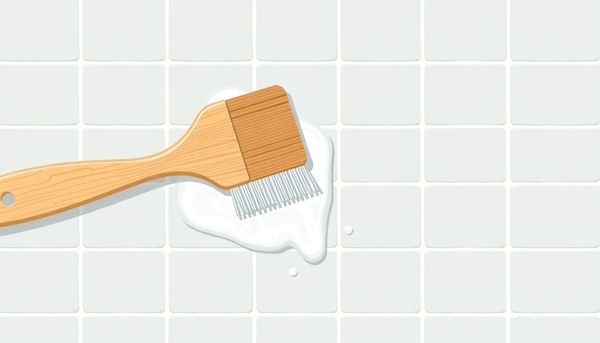
This article provided insights into maintaining your pool. Start your pool care journey today!
Want to become a pool maintenance expert? Our free Pool School course covers everything you need to know about pool care. From basic maintenance to advanced troubleshooting, you'll learn how to:
Join over 10,000 pool owners who have already transformed their pool care routine. Get started with our free Pool School course today!